Howto
How Can Consolidated Shipping Save Your Business Money?
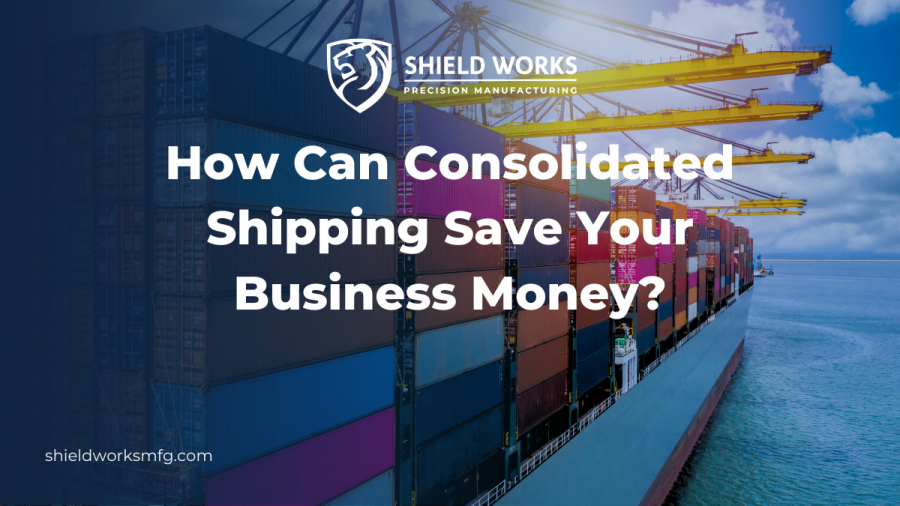
About 65% of consumers are willing to pay more for faster deliveries.
With any business that sells products, maximizing profitability should always be one of the most important focuses. While selling products is vital here, there are plenty of business operations that will affect the profits that your organization makes.
Shipping is one of the biggest factors, and the larger your business grows, the more important this will be. Consolidated shipping is a solution that can reduce costs, helping to improve your profits.
In this guide, we’ll take a look at the ways in which package consolidation can save your business money. Keep reading for more.
What Is Consolidated Shipping?
Shipment consolidation is a method of shipping goods that involves grouping multiple items together in the same package. This is a common practice with many businesses when it comes to small products. If you were to buy three pairs of socks from a clothing company, for example, you’d expect them to all arrive in the same package rather than three separate ones.
This isn’t seen so much with companies that sell large, heavy, or fragile products. Shipping such items can be more challenging, so most businesses default to packaging them separately.
Benefits of Consolidated Shipping
You may not want to immediately adopt a consolidated shipping approach, but it’s important to consider it as an option. There are several cost-saving benefits that can make it a good move for your business.
Less Expensive Shipments
If you can effectively consolidate shipments, your overall shipping expenses will drop. Every shipment has a cost, but consolidating multiple together into a single shipment will reduce these. You may even be able to share transportation with other shippers, and will then only have to pay for a portion of the costs.
Efficient Resource Utilization
Cargo space and transportation equipment are other costs you need to worry about. Consolidating shipments means that you can make the most out of these resources. More efficient use of space and vehicles means less expenses.
Reduce Carbon Footprint
Consolidating shipments helps to reduce the amount of space needed in transport vehicles. This means you won’t need to use as many trucks (or other shipment methods), leading to reduced fuel consumption.
Not only will this save money on fuel, but it’s also a more environmentally friendly approach. You can highlight this to your customers, as showing that your company is environmentally conscious will help improve your brand image.
Improved Delivery Speed
Consolidated shipping will often mean that your deliveries get to your customers faster. Faster transportation options generally cost more, so being able to save this money while still getting better results is ideal.
Enhanced Security and Reduced Risk
While it’s uncommon, there can be unexpected problems with deliveries at various points on their journey. With consolidated shipping, there are fewer transfers and handling points, which results in less risk of shipments being lost or damaged. Having to replace lost or damaged goods can be costly, so minimizing this issue can be a major benefit.
Streamlined Customs Clearance
If your business sends goods internationally, you’ll need to send them through customs. The customs clearance process can involve a lot of paperwork making shipments take longer. With shipment consolidation, you can streamline this process so you don’t have to spend as much time or money dealing with it.
Improved Customer Service
Quality customer service is vital for any business to succeed. When people order products online, they prefer to know when their goods will arrive, and being able to get shipments to customers faster is always a good thing.
Being able to meet delivery timelines and provide customers with better service will help with customer retention. It always costs less to retain customers than it does to get new ones, so this will help you maintain sales without having to worry so much about lead conversion rates.
Flexibility and Scalability
Having flexibility is always a good thing in business. Shipping consolidation offers adaptable scaling solutions, making it ideal for small and large businesses alike.
This also means it will be easier for you to scale your shipping needs as your business grows. Growth is always good, but it often presents challenges that many businesses aren’t prepared for. Being able to maintain efficient shipment practices and consistency will prevent issues that could end up costing your business a lot of money.
Collaboration and Networking
Shipment consolidation encourages collaboration between carriers, shippers, and logistics providers. This helps to foster networks and create opportunities for all those involved. Different businesses can then share resources and ideas to further benefit both of them.
Economies of Scale
As your business grows and sales increase, your cost per sale will go down. This is known as economies of scale, and consolidating shipments can help build this.
On top of saving on costs from each sale, your negotiation power with carriers will increase. You may then be able to get better rates and handling fees, as well as other potential cost advantages.
Scenarios Where Consolidated Shipping Is the Right Choice
Consolidated shipping may sound a bit complex. To get a better idea of when it would be most, consider these examples.
Firstly, if you often sell certain items together, you may benefit from consolidating them. For example, if you sell sporting goods, you might often sell skis along with items like helmets, goggles, gloves, etc. You could even offer them together as a package deal in your online store to encourage sales.
Another good example is if you have small items that could easily go into a larger box along with a large item. These small items might not need their own boxes, so you can save by packaging them with bigger items.
Just bear in mind that it’s not always the best option. Consider the potential drawbacks so you know what choice to make.
Improved Shipping and Logistics
Consolidated shipping can help you save money in a range of ways. It’s worth taking the time to refocus your logistics approach to reduce company shipping costs and make it easier for your business to grow.
Shield Works offers warehousing and 3PL services that can help you reach your business goals. Contact us today to find out more about how we can help your business.
Why China Is Your Option for Optimal Order Fulfillment

In today’s hyper-competitive global marketplace, businesses face a multitude of challenges when it comes to order fulfillment. The demands of customers for faster delivery, the need to reduce shipping costs, and the desire for efficient supply chain management have never been greater.
In this comprehensive article, we will delve deeper into why China has emerged as a compelling and expansive option for optimal order fulfillment for businesses worldwide.
The Rise of China in Order Fulfillment
China’s ascent as the “Factory of the World” is nothing short of remarkable. Over the past few decades, the country has transformed itself from an agrarian society into an industrial powerhouse.
This transformation has not only made China a manufacturing giant but also a critical player in the global supply chain.
Cost Efficiency
One of the primary reasons why businesses are turning to China for order fulfillment is cost efficiency. The low labor costs and economies of scale in China enable businesses to produce goods at a significantly lower cost compared to many other countries.
This cost advantage translates into competitive pricing for consumers and higher profit margins for businesses.
Furthermore, China’s vast network of suppliers and manufacturers in various industries means that businesses can source raw materials and components locally, further reducing costs and simplifying the supply chain.
Infrastructure and Technology
China has heavily invested in infrastructure and technology to support its manufacturing sector. State-of-the-art factories equipped with cutting-edge machinery, efficient transportation networks, and advanced logistics hubs have made order fulfillment in China faster and more reliable than ever before.
The integration of technology into manufacturing processes, including automation and data analytics, has also improved efficiency and quality control. This technological prowess has made China a leader in industries such as electronics, automotive, and advanced manufacturing.
Skilled Workforce
China boasts a vast pool of skilled labor, from engineers to factory workers. This skilled workforce ensures that products are manufactured with precision and efficiency, meeting the highest quality standards. Additionally, Chinese workers are known for their adaptability and dedication, which contributes to the overall reliability of order fulfillment operations.
The Role of E-Commerce
The rise of e-commerce has revolutionized the way businesses operate, making efficient order fulfillment even more critical. China’s e-commerce ecosystem is one of the most advanced in the world, with companies like Alibaba and JD.com leading the way.
Wide Market Reach
China’s e-commerce platforms provide access to a massive consumer base, not only within China but also across the globe. This wide market reach is a significant advantage for businesses looking to expand their customer base. With the right e-commerce strategy, businesses can tap into China’s enormous consumer market, which continues to grow rapidly.
Efficient Fulfillment Services
Chinese e-commerce giants offer comprehensive fulfillment services, from warehousing and inventory management to shipping and returns processing. This end-to-end solution simplifies order fulfillment for businesses and ensures a seamless customer experience. E-commerce platforms in China are continuously innovating to meet the evolving demands of consumers, providing businesses with access to the latest fulfillment technologies and strategies.
Supply Chain Integration
Effective supply chain management is at the heart of successful order fulfillment. China’s strategic location in Asia makes it a hub for global supply chain integration.
Proximity to Suppliers
Many suppliers of raw materials and components are located in Asia, and China’s proximity to these suppliers reduces lead times and transportation costs. This proximity allows businesses to quickly adjust to changes in demand and take advantage of emerging opportunities.
Global Shipping Routes
China’s extensive network of ports and shipping routes connects businesses to markets worldwide. This connectivity ensures that products can be shipped efficiently to customers anywhere on the planet. The Belt and Road Initiative, a massive infrastructure project led by China, further enhances global connectivity, opening up new trade routes and markets for businesses.
Overcoming Challenges
While China offers numerous advantages for order fulfillment, businesses must also navigate some challenges.
Language and Cultural Differences
Doing business in China may require overcoming language and cultural barriers. However, many service providers and consultants specialize in helping foreign businesses navigate these challenges. Partnering with local experts can facilitate smoother communication and relationship-building with Chinese partners and customers.
Regulatory Compliance
China has specific regulations and standards that businesses must adhere to. Partnering with local experts who understand Chinese regulations can simplify the process of complying with these requirements. It’s crucial for businesses to stay up-to-date with changes in regulations and work proactively to ensure compliance.
In a rapidly evolving global marketplace, optimal order fulfillment is essential for the success of businesses. China’s industrial prowess makes it a compelling choice for businesses seeking to streamline their supply chain and meet customer demands efficiently. While challenges exist, the benefits of choosing China for order fulfillment are undeniable, making it a top option for businesses looking to thrive in the modern world of commerce. Working with a manufacturer like Shield Works can help you leverage China’s strengths and addressing its challenges, businesses can position themselves for success in the global market. Contact us now!
How to Choose the Right Contract Manufacturer in China
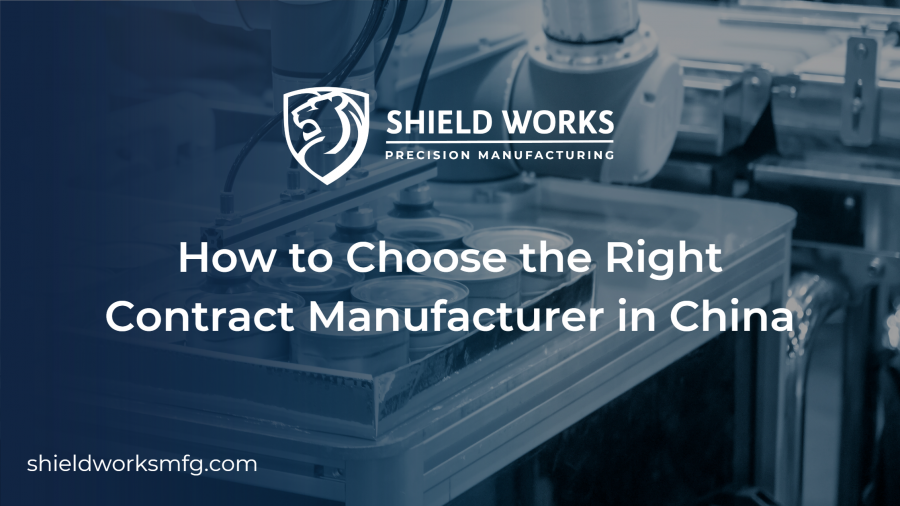
If you’re considering outsourcing your manufacturing operations, China might be an option you’ve already explored. With its vast manufacturing industry, China is a popular destination for companies seeking to manufacture their products at a lower cost. However, with numerous contract manufacturing companies in China, selecting the right one can be challenging.
In this article, we’ll take you through the process of selecting the best contract manufacturing company in China for your needs, keeping in mind the importance of perplexity, burstiness, and low predictability in our writing style.
Step 1: Determine Your Manufacturing Needs
To choose the right contract manufacturing company in China, you must first determine your manufacturing needs. Consider the type of product you want to manufacture, the quantity you require, and your budget. Knowing your needs will help you narrow down your search to companies that specialize in your industry and can meet your production requirements.
Step 2: Research and Shortlist Contract Manufacturing Companies
After determining your manufacturing needs, it’s time to research and shortlist contract manufacturing companies in China. Look for companies that have experience in your industry and offer the services you require. You can use search engines, industry directories, and trade shows to find potential manufacturers. Shortlist at least three to five companies that meet your requirements.
Step 3: Evaluate the Shortlisted Contract Manufacturing Companies
With a shortlist of contract manufacturing companies in China, it’s time to evaluate them. Look for information about their manufacturing capabilities, quality control processes, and certifications. You can also check their website, social media, and online reviews to see what their clients say about their services.
To assess their communication skills, responsiveness, and transparency, it’s a good idea to reach out to the companies and request more information. You can ask for a quote, references, or even arrange a visit to their factory.
Step 4: Compare and Choose the Best Contract Manufacturing Company
After evaluating the shortlisted companies, it’s time to compare and choose the best contract manufacturing company in China for your needs. Consider factors such as their experience, quality, pricing, lead times, and communication skills. Additionally, look for a company with a good reputation that can provide references from satisfied clients.
Before starting any manufacturing project, it’s essential to have a detailed contract in place that outlines all the terms and conditions of the agreement, including payment terms, delivery dates, quality standards, and intellectual property rights.
Step 5: Maintain a Good Relationship with Your Contract Manufacturing Company
Once you’ve chosen a contract manufacturing company in China, it’s crucial to maintain a good relationship with them. Regular communication, timely payments, and feedback can help you build a long-term partnership with your manufacturer. A good relationship can lead to better quality products, faster lead times, and more competitive pricing.
Apart from the above steps, there are a few other things to keep in mind when choosing a contract manufacturing company in China.
Cultural Differences
Firstly, you must consider the cultural differences between China and your home country. It’s essential to understand these differences to avoid any misunderstandings or communication gaps.
Shipping & Logistics
When working with a contract manufacturing company in China, you must consider the cost of shipping and logistics. This includes factoring in the cost of shipping, import duties, and taxes when calculating the total cost of production.
Geopolitics
You must consider the political and economic climate in China as it can significantly impact the manufacturing industry. It’s crucial to keep an eye on any developments that may affect your manufacturing project.
Regulations & Standards
Also ensure that the contract manufacturing company you choose in China is compliant with all the relevant regulations and standards. This includes labor laws, environmental regulations, and quality standards.
As a final note, it’s important to mention that the process of choosing the right contract manufacturing company in China can be time-consuming and requires careful consideration. Rushing into a partnership with a manufacturer without doing proper research and evaluation can lead to costly mistakes and potential production delays.
By following the steps outlined in this article and taking into account the additional considerations mentioned, you can increase your chances of finding a reliable and trustworthy contract manufacturing partner in China. With the right partner, you can achieve your manufacturing goals, maintain quality standards, and remain competitive in your industry.
In conclusion, outsourcing your manufacturing operations to China can be a viable option for companies looking to reduce costs and increase production capacity. However, it’s crucial to choose the right contract manufacturing company that meets your needs, has a good reputation, and is compliant with all relevant regulations and standards, one like Shield Works, with our own precision assembly facility and network of over 500 suppliers, and 18 years of industry experience. Contact us today, and achieve success in your manufacturing projects.
A Beginner’s Guide to Manufacturing Service Agreements
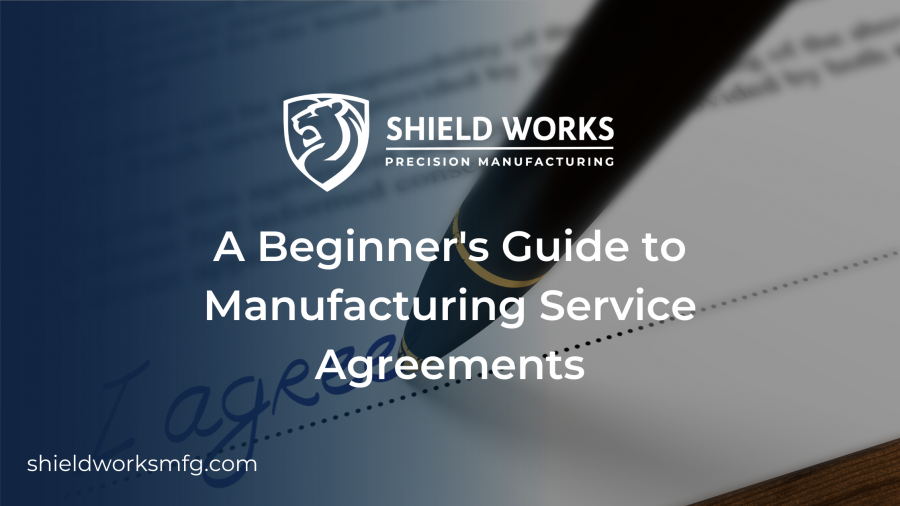
Manufacturing is a critical component of many businesses, but not all companies have the resources or expertise to handle the production process in-house. That’s where outsourcing comes in, and a crucial tool for outsourcing manufacturing is a Manufacturing Service Agreement (MSA). In this beginner’s guide, we’ll take a closer look at what MSAs are, why they’re important, and what you need to know to get started.
What is a Manufacturing Service Agreement?
A Manufacturing Service Agreement is a contract between two parties – the manufacturer and the customer – that outlines the terms and conditions of the manufacturing process. The agreement covers everything from the type of product to be manufactured to the cost, timeline, and quality standards. Essentially, an MSA defines the relationship between the two parties and sets the expectations for the manufacturing process.
Why is a Manufacturing Service Agreement Important?
An MSA is important because it ensures that both parties have a clear understanding of their obligations and responsibilities. This clarity helps to minimize misunderstandings and disputes, which can lead to costly delays and rework. Additionally, an MSA protects the customer’s intellectual property and ensures that the manufacturer is producing the product to the customer’s specifications.
Another important aspect of an MSA is that it outlines the process for resolving disputes. In the event of a disagreement, having a well-defined process in place can help to minimize the impact on the manufacturing timeline and reduce the risk of costly legal battles.
Key Components of a Manufacturing Service Agreement
There are several key components that are typically included in an MSA. These include:
Product specifications
This section outlines the product design, materials, and manufacturing process.
Timeline
The timeline section specifies the expected start and completion dates for the manufacturing process.
Cost
The cost section outlines the payment terms, including the total cost, payment schedule, and any additional fees.
Quality Standards
This section outlines the quality standards that the manufacturer is expected to meet, such as industry standards or customer-specific requirements.
Intellectual Property
This section outlines the ownership of the product and any related intellectual property, such as patents or trademarks.
Confidentiality
The confidentiality section outlines the obligations of both parties to maintain the confidentiality of the manufacturing process and any related information.
Liability and indemnification
This section outlines the responsibilities of both parties in the event of any losses or damages.
Dispute Resolution
The dispute resolution section outlines the process for resolving any disputes that may arise during the manufacturing process.
Getting Started with a Manufacturing Service Agreement
Now that you have a better understanding of what a Manufacturing Service Agreement is and why it’s important, it’s time to get started. The first step is to identify your needs and the type of product you want to have manufactured. This will help you to determine the type of manufacturer you need to work with and the specifications that must be included in the MSA.
Once you have identified your needs, it’s time to start negotiating the terms of the MSA with the manufacturer. This is a critical step, so it’s important to work with an attorney who specializes in MSAs to ensure that you are getting the best deal possible.
How to Negotiate a MSA That Benefits Your Business
When it comes to a complex legal document that can have a significant impact on your business, you always want to ensure that you are getting the best deal possible. That’s why it’s important to know how to negotiate a good MSA that benefits your business. Here are some tips to help you get started:
Do Your Homework
Before you start negotiating the terms of the MSA, it’s important to do your homework. Research the manufacturer and understand their capabilities and limitations. This will help you to determine the type of agreement that you need and the terms that must be included in the MSA.
Work with an Attorney
An attorney who specializes in MSAs can help you to understand the legal implications of the agreement and ensure that you are getting the best deal possible. They can also help you to navigate any potential obstacles and negotiate the terms of the agreement effectively.
Outline Your Needs
Clearly outline your needs and the type of product you want to have manufactured. This will help you to determine the type of manufacturer you need to work with and the specifications that must be included in the MSA.
Be Realistic
When negotiating the terms of the MSA, it’s important to be realistic. Make sure that the terms are achievable and that you have the resources and expertise to meet the obligations outlined in the agreement.
Focus on the Big Picture
While it’s important to pay attention to the details, it’s also important to focus on the big picture. Make sure that the MSA meets your overall business goals and supports your long-term strategy.
Be Flexible
Be willing to compromise on certain terms in order to reach an agreement that benefits both parties. Remember that the goal is to create a mutually beneficial relationship that will last for the long-term.
Don’t Rush the Process
Negotiating an MSA can take time, so it’s important not to rush the process. Take the time to review the agreement carefully and ensure that you are comfortable with the terms before you sign.
By clearly defining the terms and conditions of the manufacturing process, an MSA helps to minimize misunderstandings, protect intellectual property, and ensure that the manufacturing process meets the customer’s expectations. Whether you’re a seasoned professional or just starting out, understanding MSAs is an important step in successfully outsourcing your manufacturing needs.
As a reputable manufacturing company with positive references in the industry, Shield Works always ensures our customers’ rights are well respected and honored. To know more about us, please feel free to contact us!
10 Boxes to Check Before Choosing a Product Supplier in China
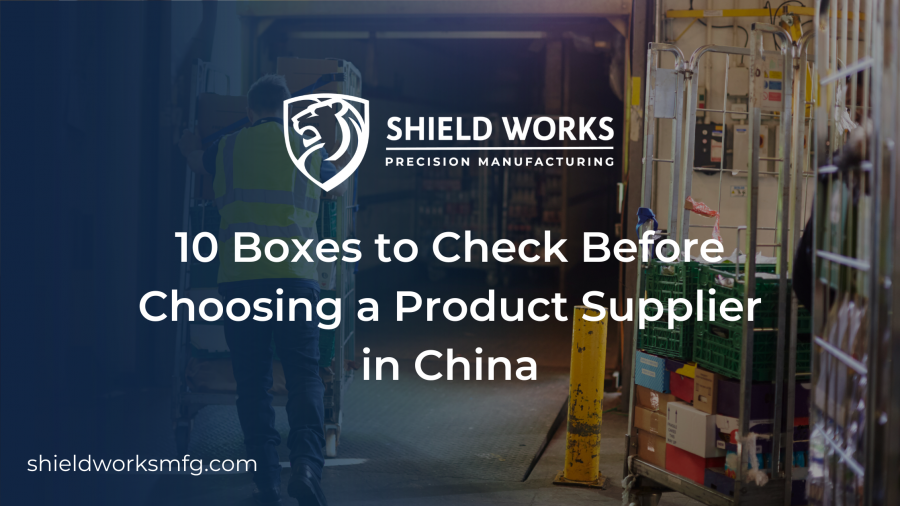
If you’re serious about your business, you want to work with the best product supplier in China. A high-quality product made in China is crucial to your success, because if it isn’t up to par, then you won’t be able to compete with other businesses in your field. However, finding the right product supplier isn’t always easy – here are 10 boxes to check before choosing one to do business with.
1) Does the supplier have a good reputation?
Reputation is key when choosing a good supplier. Ask for references and read reviews from people who have used their products. If the feedback is positive, it’s likely that the supplier has a good reputation. Don’t hesitate to ask questions about their experience with the company and production quality. You want to make sure that you’re not just trusting someone based on what they say, but what they do as well.
2) How long has the supplier been in business?
A company’s longevity can be an indication of its success, so you should make sure that the supplier has been in business for at least three years. Once you’ve found a supplier with a good track record, it will be easier for you to establish trust with them and build your relationship.
Moreover, how long has the supplier been in business is often indicative of their product quality. Manufacturers that have been around for decades can afford higher-quality materials than start-ups because they’ve had time to establish themselves and develop relationships with suppliers. Therefore, when you’re choosing between two suppliers that are roughly equal on other factors, it’s generally safe to go with the one that has more experience behind them.
3) Is the supplier certified?
It’s also important that the supplier you choose is certified. You want someone who has gone through all the certification process necessary for importing and exporting goods from China, so you know they’re going to be legally compliant and up-to-date with all requirements.
Here’s a list of certificates or documentations you can check for.
1) Are there business licenses (including both Chinese and your country of import)?
2) Is there proof of customs clearance (including: export license, import license, customs declaration form)?
3) Do they have manufacturing certifications? There are three certifications that we like our manufacturers to have – ISO9001, ISO14001 and OHSAS 18000.
4) What kind of insurance do they have in place?
4) What is the minimum order quantity?
The minimum order quantity (MOQ) is the number of units that you have to buy from the supplier. It’s important because it will affect your profitability.
There’s no hard and fast rule for how large your minimum order quantity should be, but it all depends on how much it will cost you to buy those items. Take into account any shipping costs that are applicable, as well as possible tariffs and taxes.
For example, if you’re ordering small quantities of product samples from an overseas supplier that’s relatively close by, they may offer you free shipping. If they don’t offer free international shipping, however, that could make your products prohibitively expensive.
5) What are the payment terms?
Ideally, you want an invoice that is settled within 30 days of the shipment of goods. If they don’t offer terms then it is important to find out how often they require payment and what their payment terms are.
Your payment terms should also specify how late payments are accepted. If they accept payments late (for more than 30 days), it may not be ideal. If they do not accept late payments, find out how long it takes for them to send you a reminder before sending your account to collections or blacklisting you from future business.
6) How much experience does the supplier have?
Experience is important because it reflects the supplier’s ability to produce quality products. To figure out how experienced the supplier is, you’ll need to ask about their experience. If they’ve been around for more than five years, they’re more likely to be a reliable option.
But don’t stop there. After you verify the supplier’s experience, make sure that they can handle your volume and product needs by asking if they have any examples of past projects and inquiring about the size of their team and production capacity.
Also, the type of products they have experience is crucial. One way to know this is to check what industry awards they may have won. Awards are often indicative of an organization’s professionalism and dedication to excellence, which is always a good sign when looking for suppliers.
7) What is the lead time?
The lead time is the amount of time it will take for you to receive your order. This can vary greatly depending on what type of product you are ordering. For something as simple as pens, the lead time can be as little as two weeks. But for something more complicated like electronics, you will need much more than that and might need up to 20 weeks, if including product design and development, before your order arrives.
8) Can the supplier provide samples?
If you can’t see and touch the product, it’s hard to know how well the supplier will be able to make it. You want samples of any products you’re interested in for your own reference, but also so that you can show them off and gauge interest from potential clients.
Even if your product is unique, any buyer will expect to be able to touch and feel it for themselves. It’s important that you can get actual samples of your product before placing an order with your supplier. It may not be free, but this will give you time to check quality, so you can make changes or correct any issues with your design before you place a mass order. Make sure your contract allows for multiple revisions on prototypes so that more expensive mistakes are minimized as much as possible.
9) What is the quality control process?
A quality control process is an important step for any company. It helps identify and manage risks that may affect your product quality. The goal of the process is to ensure that your products are safe and meet certain standards.
If you’re not sure what kind of processes to expect, then you should ask your supplier about their quality control procedures. You should also check with the manufacturer about their procedures as well.
They will be able to provide specific details on how they produce their goods. For example, if you want to know more about how they make textile items, they’ll likely tell you exactly what type of fabrics they use or what chemicals they dye their fabric with.
You can also ask for a sample of their checklist so that you have a better understanding of their system.
10) What is the warranty?
You should also ask about the warranty on the product. Is it one year or two years? If it’s one year, what is the cost for an extended warranty? A supplier may have different warranties for different types of products.
For example, if you are buying a refrigerator and there is an issue with its compressor after six months, but not with its ice maker, then the compressor would likely be covered under warranty while the ice maker would not be.
If you are buying light fixtures from your supplier that have bulbs included and you find out that the bulbs only last for three hundred hours before they burn out, ask about how many replacements will be included during your time of purchase.
Shield Works has been around for over 17 years already with industry-spanning experience. Contact us today to see how we can help!
Supply Chain Management: The Backbone of Your Business

Supply chain management is the backbone of any company, big or small, that deals in physical goods with substantial production and distribution processes. When you’re starting out your business, supply chain management might seem like an afterthought; you’re more concerned with what goes on inside your company than the goods that come in and out of it. But when you’re ready to scale up, you’ll need a way to manage your goods from their point of origin all the way to where they’re being used—and that’s where supply chain management comes into play.
What Is A Supply Chain?
A supply chain is the network of all suppliers and producers, distributors, warehouses, and end customers involved in producing and delivering a product. Supply chains are found in a variety of industries including automobile manufacturing.
A consumer goods business’s supply chain can be broken down into four main categories: supplier development and management; distribution; operations management; and customer service. These four components work together to ensure that goods are delivered to customers on time while maintaining a high level quality.
Suppliers need to be monitored for quantity, delivery times, and any changes in price or availability. Distribution requires coordination with carriers and transportation services for getting products from point A to point B without any delays or damage. Operations must handle such things as plant floor layout, storage equipment design, assembly line design, production scheduling strategies and inventory levels. Customer service involves managing customer expectations with respect to pricing/costs, lead times and order fulfilment.
An effective supply chain is crucial because it ensures your company has continuous supplies which allows you to stay competitive by meeting your customers’ needs at a low cost while still ensuring profit margins remain healthy enough for long-term success.
Benefits Of Having A Good Supply Chain In Place
A good supply chain will ensure the availability of your products and services to buyers. Having a reliable supply chain in place means you can trust that what is promised is delivered, without worries about product shortages or delivery delays. It also means you can focus on other aspects of your business, such as marketing and customer service, knowing that your supply chain is running smoothly. Good inventory management also saves you money by reducing the amount of time spent managing inventories; it eliminates waste by reducing excess production; and it prevents overbuying or underbuying by estimating demand more accurately.
It also allows you to offer same-day shipping or delivery services, which can greatly improve your customer experience while enhancing your brand image in shoppers’ eyes. Finally, having control of every step of the process from production to distribution gives you peace of mind because you know where your products are at all times.
Problems With A Poorly Planned And Managed Supply Chain
A poorly planned and managed supply chain can lead to a variety of problems. For example, if your supplies are delivered late or in the wrong quantities, it will be difficult for you to keep up with demand and meet customer expectations. This could cause your customers to look elsewhere for products, meaning you’ll lose money. Similarly, if something goes wrong with a shipment – say you ordered 2,000 units but only received 1,500 – then you won’t have enough product on hand to fulfill orders and may have to cancel some orders altogether. This can damage your reputation as well as cause delays in production that hurt your bottom line.
In addition, a poorly planned and managed supply chain can lead to even financial problems. If your supplier ships you faulty products – say they accidentally send you 2,000 units that don’t work properly – then it may be difficult for you to get a refund or replacements. This could force you to halt production as your staff tries to identify and replace all of these faulty units and seek compensation for losses. Worse still, if there’s an issue with your suppliers’ products that leads to serious injuries or health complications for customers, then it may be difficult for you to find a lawyer who will take up your case due to consumer protections laws in many countries. And it’ll be detrimental to your cash flow.
How Can You Effectively Manage An Effective Supply Chain?
There are many factors to consider when it comes to supply chain management, but the most important is having a plan. You should start by writing down all the points that are essential to your business and then create a list of what you need for each point. You can also make use of a system that will help you manage your inventory and keep track of where things are in the process. When it comes to order fulfillment, be sure that you have enough space in your warehouse or storage area to account for the time it will take for customers’ orders to arrive. If you’re not sure how much space you’ll need, speak with a professional who deals with these matters on a daily basis.
Or you can hire a professional supply chain management company. They will work closely with you to establish goals for your organization’s future manufacturing plans as well as strategies that address potential problems like an increase in problems or changes in technology. They also provide recommendations and support for establishing a sustainable supply chain strategy. With their guidance, there’s no doubt about it: You’ll be able to continue running an effective supply chain without wasting money, resources, or time.
Shield Works Can Take Care of It All
Shield Works has over 17 years of experience in managing supply chain, all the way from manufacturing to delivery. We can help you achieve your goals and objectives while saving time and money. For a free consultation on how we can help your business, call today!
How to Work Successfully with a Product Development Company in China
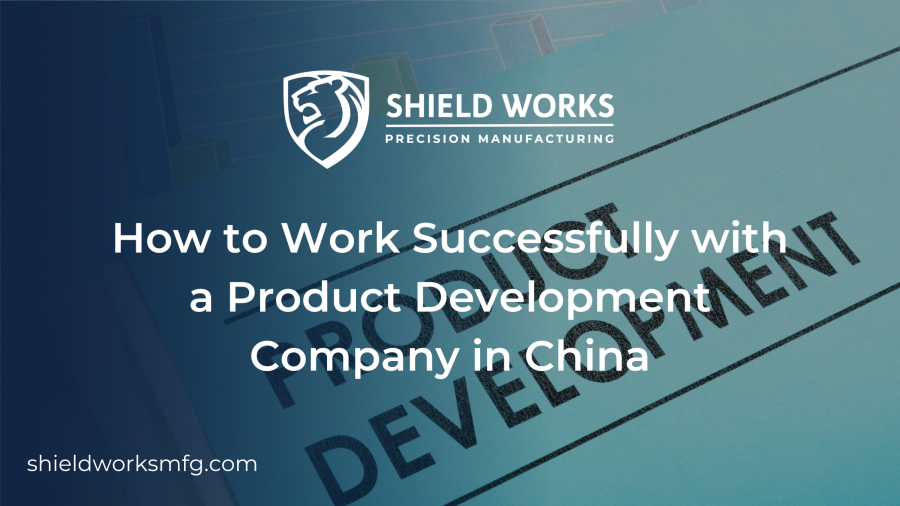
Whether you’re outsourcing manufacturing or just having product development done, working with a product development company in China may be the best thing you can do for your company. It’s not always easy to work with these companies and get what you want, but by following these tips, you can make sure you have the best experience possible when working with a product development company in China.
Researching if a Chinese company is right for you
Do your research to make sure the company is reputable and has a good track record. Request referrals from other clients, read reviews, and look for third-party verification on their website or social media pages.
If you’re still not sure, contact your potential manufacturer directly via email or phone to ask them questions about their manufacturing process, products they’ve made before, turnaround time, etc. Make sure you’re clear on what you want upfront so there are no surprises later. Make sure you have a clear idea of how much it will cost and how long it will take to get the product manufactured once all details have been finalized.
Finding the right supplier
There are many things to consider when looking for a supplier, such as cost, quality, turnaround time, and communication. Quality is always the most important consideration but you will have to weigh that against your budget and desired timeline. For example, if you’re going for high-quality but don’t want it delivered quickly, you’ll need to find someone who specializes in producing slow-moving items or can give you a discount on the price.
A product development company with a widespread network of suppliers in China can help you a lot as they provide a vast pool of options for you. This can save you time and money, as you’re likely to find several good suppliers from one firm.
Use an Online Translation Tool
If you’re looking to develop a product with a company based in China, it’s important to establish clear communication from the start. Using an online translation tool can help bridge the language barrier and ensure that both parties are on the same page. You should find a reliable translation software provider such as Google Translate or ICanLocalize before your project starts.
Always be sure to get in touch with your partner before starting work on your project. Communication is key to everything, and make sure you language is simple to understand. Do not assume that the partners will understand what 5×5 means when used in reference to size, or finish by Labor Day, as the Chinese Labor Day falls on May 1, when referencing deadlines. Be specific when discussing measurements and timelines so there is no confusion.
Use Templates as a Starting Point
When you are ready to start working with a product development company in China, it is important to have a clear idea of what you want your product to be. Templates can be a great starting point for this process. However, be sure to communicate your vision clearly to the company you are working with.
It may also be helpful to do some research about popular products on the market and create images or sketches based on these ideas. For example, if you want a toy that will help teach toddlers how to count and learn colors, you could use pictures of other toys that teach those skills as a template.
Ask For Samples
Always ask for samples of their previous work. This will give you an idea of their quality and craftsmanship. If possible, try to have someone visit their facilities, given the current travel restrictions, and meet with their team in person. This will help you get a better sense of who you’ll be working with and how they operate.
It’s important to find the right balance between trusting your instincts and choosing the company that checks all your boxes when it comes to your budget, timing, quality standards and expertise.
Document Everything
When working with a product development company in China, be sure to document everything. This includes contracts, communication, and any other important details. If god forbid, when it comes time for you to file a complaint or lawsuit against the manufacturer, you will have everything on hand for the process.
It is also important to remember that often times there are discrepancies between what was agreed upon and what was actually delivered. It is best to document as much as possible so that you can catch these discrepancies early before they escalate into an issue.
Deal With Design Changes at Scale
Changes are common in a design process. They may be minor, such as changing the color or size. Or they can be major, such as changing materials or components and all that entails. However, it is important to note that there are two types of changes: those that can easily be made at scale and those that cannot. The latter must always be done by hand.
When working with a product development company in China, make sure you specify which type of change you want done so the designer will know what to do! If your project requires many changes, have your Chinese manufacturer provide guidance on how to handle them.
Working with a product development company in China is not something to take lightly, but the rewards can be great if you do your research. That takes an experienced product development company for you to achieve, and Shield Works is one with 17 years of experience in this area. Reach out to us if you’d like to know more!
5 Reasons Why Making Your Product Prototype in China Is A Good Choice

Are you looking to make your product prototype in China? If so, your decision might be the right one, but there are several factors that must be taken into consideration beforehand, such as cost and the amount of time needed to complete the project. Let’s take a look at 5 reasons why making your product prototype in China may be your best choice.
Advanced Technology
China has been increasingly investing in advanced technology, making it a go-to destination for product prototyping. With state-of-the-art facilities and experienced engineers, China can create high-quality prototypes quickly and efficiently. If you need to make changes to your prototype, all you have to do is send the design files over the internet and let them know what changes you want made. Advanced technology means that more complex products like robotic arms or 3D printers are readily available as well.
They also have a huge variety of materials including metals, plastics, ceramics, textiles and wood, which means you can be experimental in the process. For example, if you wanted a metal tumbler but one was not readily available on Alibaba’s website, they could use stainless steel sheets to create one for you.
Prototyping speed
There are a few reasons for this. The vast majority of Chinese manufacturers are extremely efficient and organized. They can usually turn around a prototype much faster than their Western counterparts.
Second, the cost of labor is much lower in China, so the cost of making last minute change will be lower and more feasible as well. Chinese manufacturers are often more flexible and willing to make changes to the prototype than Western manufacturers.
There is also a wide range of manufacturing capabilities in China, so you’re likely to find a supplier that can meet your specific needs. Meanwhile, many Chinese manufacturers have experience working with Western companies, so they’re accustomed to meeting Western standards.
Cost Saving
When it comes to cost savings, making your product prototype in China is a no-brainer. Chinese manufacturers are able to produce high-quality prototypes at a fraction of the cost of their Western counterparts. As we mentioned above, the low cost of labor in China means that you can get your prototype made for a fraction of what it would cost to have it made in the West.
The low cost of labor also means that there’s no need to worry about sourcing locally and incurring additional expenses by having everything shipped over. Plus, if you’re working with a larger company and require different types of prototyping services like 3D printing or metal casting, as they likely already have all these materials on hand, that can also save you even more!
International and Industrial Experience
If you’re looking for an experienced and reliable manufacturing partner to help bring your product to life, China is a great option. You’ll benefit from China’s vast pool of international and industrial experience, as the country is home to some of the world’s most advanced manufacturing facilities and technologies. The vast majority of Chinese manufacturers are ISO 9001 certified, so you can be confident in their quality control processes.
You’ll also find that China has factories that specialize in producing various components for both domestic and export markets, which will allow you to save on costs by using only one factory. Even if your company is small or medium-sized, it will have no problem finding a manufacturer with the capacity to produce your order.
Most factories have relationships with overseas buyers who they work with regularly; this means they can give you priority service even if they are busy with other clients at the time. In fact, many factories have English speaking staff members who will work closely with you throughout production process.
Faster Delivery
For many startups and small businesses, the biggest advantage of working with a Chinese manufacturer is not only the speed at which they can get product prototype made, but also delivered. This can ensure more flexibility in reviewing and making more spontaenous changes.
Many Chinese manufacturers use logistics and shipping companies to ensure quick deliveries, with a wide selection of ports or even airports to ship, wherever your prototype is made. Their logistical networks are very expansive and spreads all around the world, so no matter you are located, your prototype can always manage to arrive in time!
All of these aforementioned factors make China an attractive option for entrepreneurs who are looking to create a new product prototype. If you want your company to take off, and you’re considering which country would be the best fit for your new project, it’s worth investing some time into learning more about China’s cost-effective benefits. All it takes is a reliable and experienced manufacturing company, such as Shield Works. We have over 17 years of experience of prototyping and international team that ensures smooth communication. Reach out to us if you’d like to know more!
5 Reasons Why Manufacturers in China Can Help You Gain Your Customers’ Trust
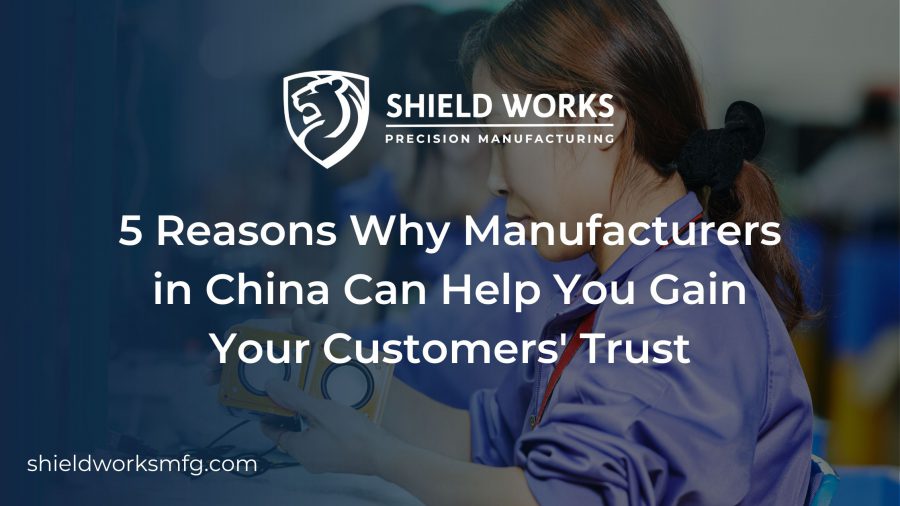
Your customers are cautious when it comes to trusting your brand with their hard-earned money, especially if you’re new on the market. But offering them high-quality products that solve their problems and make their lives easier goes a long way toward building their trust in you and your brand. If you’re having trouble manufacturing products that meet this high standard, consider manufacturing them in China, where companies like ours can offer you extensive expertise in product development and production. Here are five reasons why doing so will help you earn your customers’ trust.
1) Manufacturing as a service
When you outsource your product development to a contract manufacturer in China, you’re getting more than just a manufacturing partner. You’re also getting access to a wealth of knowledge and experience that can help you create a product that meets and exceeds your customers’ expectations.
A good contract manufacturer will have a team of experienced engineers who can offer valuable insights into the design and manufacture of your product. They’ll also be up-to-date on the latest manufacturing technologies and trends, which can help you create a cutting-edge product.
Additionally, most contract manufacturers in China have established relationships with suppliers, which can give you access to high-quality components at competitive prices.
2) Always-on customer service
In today’s world, customers expect 24/7 access to customer service, no matter where they are or what time it is. By partnering with a manufacturer in China that offers always-on customer service, you can be sure that your customers will always be able to reach someone when they need help. This can help build trust and loyalty, both of which are essential for any business.
Also, manufacturers in China provide your customers with high quality products, which reduces the chance of filing a complaint to customer service to begin with. When manufacturers are focused on producing only high-quality products, the product development process becomes more streamlined and efficient because there’s less risk of defective products making it to the marketplace.
3) Transparency and flexibility
When it comes to manufacturing, Chinese manufacturers are known for their transparency and flexibility. This means that you can be sure that your products are being made to the highest standards possible, and you get to monitor the whole process.
Many of the production facilities in China are well equipped with a surveillance system that offers you access to the process anytime of the day. If anything goes wrong, you won’t need to worry about being shielded out. Your factory is just one Skype call away! Some of these factories also offer an on-site consulting service where they’ll give advice on how to increase efficiency and quality at your plant.
Another perk? They will often offer training courses at their facility so that employees at your company can learn new skills while they’re there.
4) Customization and Personalization
In today’s market, customers are looking for a personalized experience. They want products that are tailored to their specific needs and preferences. By working with manufacturers in China, you can create products that are truly unique to your brand. This will help you stand out from the competition and make a mark in consumers’ impression.
If your competitors are using generic items that have been sourced through a third-party company, they’re not going to be able to offer this kind of customization. Manufacturing in China allows you to cater specifically to these wants and desires so it gives you an edge over the competition.
It’s important to note that, with a Chinese manufacturer, you don’t have to invest heavily into personalization from day one. Start small and build your way up so you can expand as necessary. If a company is able to add some flare or customize a product without it affecting their bottom line, they will be more willing to do so over time. Just knowing you’re listening closely to consumer demands gives customers confidence that you’re paying attention and want them back for future purchases.
5) Testing before shipping
Any good manufacturer will test products before shipping to ensure they meet both the quality standards of the company and the customer’s expectations. In addition, manufacturers in China have a reputation for being able to quickly adapt to new designs and requirements, which can be extremely helpful when your product is still in development.
Furthermore, many Chinese manufacturers offer very competitive prices without compromising on quality, which can help you save on costs. Finally, by working with a Chinese manufacturer, you can be sure that your products will be made with the latest technology and equipment available.
If you insist in inspection all the way through, it’s very common in China to hire a 3rd-party inspection for quality control. There are some experienced inspectors who are well-known and trustworthy. Once production is completed, the factory may ask the inspector to come in and do final inspection according to your requirement such as checking if there are any broken parts or other defects. After approval from the inspector, they ship out goods immediately.
Earning trust is a lasting process. With a reputable Chinese manufacturer, you will rest assured every step of the way. Shield Works is one with a great reputation for its 17 years of experience with global retailers. Contact us for more!
Qualities to Look for in a China 3rd-Party Quality Control Service Provider
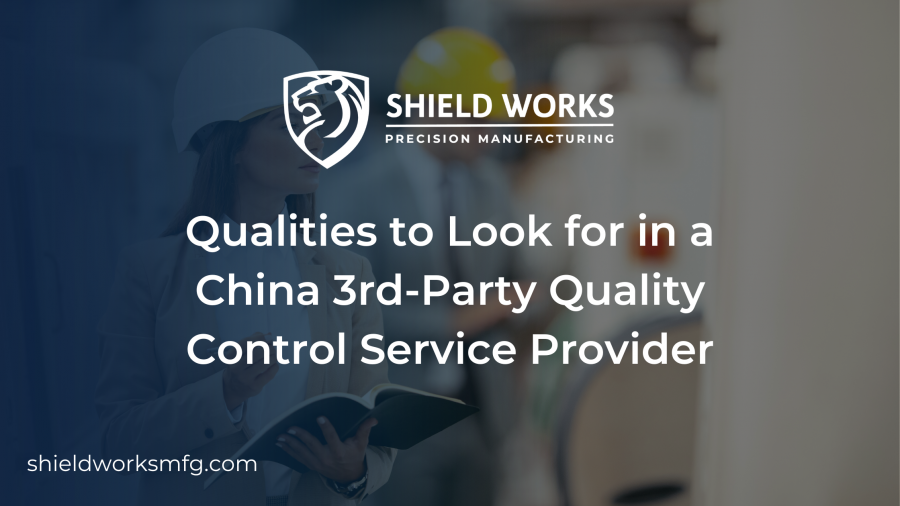
When you’re manufacturing in China, it’s essential to have 3rd-party quality control to ensure that your products are up to your standards. But which companies should you be choosing from? The answer can be found in these three qualities of the best China 3rd-party quality control service providers out there.
Prompt Communication
One of the most important qualities you should look for when choosing a quality control service provider is prompt communication. This means that they should be responsive to your inquiries and requests in a timely manner. They should also keep you updated on the status of your order and any changes that may occur. A reliable China 3rd-party quality control service provider will not leave you hanging or waiting for updates about your orders, as this could result in delays.
When picking out a potential quality control service provider, make sure they are open and honest with you during their initial communications. If they do not answer all of your questions thoroughly, it might be best to find someone else who can.
Dedicated Staff
One of the most important qualities to look for when choosing a quality control service provider is whether or not they have a dedicated staff. This team should be knowledgeable about quality control procedures and able to handle all aspects of the process from start to finish. They should also be available promptly enough to answer any questions or concerns you may have.
Another important factor to consider is whether or not the quality control service provider has an in-country office. This is important because it allows them to be on the ground in China, which gives them a better understanding of the local culture. It also means that they are more likely to have connections with suppliers and factories since they’re in close proximity.
If this doesn’t sound like something your current supplier offers, then you might want to switch providers.
A Wide Range of Products
You should look for a quality control service provider that has experience with a wide range of products. This way, you can be sure that they will be able to handle whatever product you need them to inspect. They should also have a good understanding of the manufacturing process and know how to spot potential problems.
If they are not well versed in your industry, it could take them much longer to find any issues. For this reason, it is important to find a quality control service provider who specializes in your industry as well as inspection type.
Good Prices
You want to be sure that you’re getting a good price for the services provided. A quality control service provider should be able to offer you competitive prices that are in line with the market. It’s important to do your research before deciding on any company. Ask other businesses who they use and compare prices before making your decision.
You also want to make sure that you get a fair deal when it comes to pricing. A high price tag doesn’t always mean better quality, so don’t be afraid to ask about how the rates were determined. In some cases, you might even find out that there are hidden fees or expensive fees after looking at the total amount of money you’ll have to pay at the end of a project. Another thing is if they charge by hour or by job, because this will affect how much time it takes them to complete their work and also what they’ll charge per unit of work completed.
Innovative Solutions
You should look for a quality control service provider that is innovative and always looking for new ways to improve their services. They should also be able to provide you with customized solutions that fit your specific needs. A good quality control service provider will do whatever it takes to make sure that the products they are inspecting meet or exceed your standards. They are able to work around any problems, such as issues with how the product was manufactured, or even communication barriers if necessary.
They also have to be well trained in inspection techniques so that they can find any defects before the goods are sent off. Some of these may include chemical tests, sensory evaluations, and destructive physical inspections.
Does Not Need Face Time
One of the most important qualities to look for when choosing a quality control service provider is that they don’t need face time. This is important because it means that they’re able to work independently and don’t need constant supervision. They should also be able to communicate effectively and have a good understanding of Chinese suppliers. A company with these qualities will be better equipped to handle the needs of your company than one who requires hands-on direction, which may not always be possible or even necessary.
There are many things to consider when choosing a quality control service provider in China. Make sure to do your research and ask around before making a decision. To sum it up, the most important qualities to look for are experience, flexibility, customer service, consistency and professionalism. With so many providers to choose from, you should be able to find one that meets all of your needs. Shield Works is one with 17 years of professional experience as well as its own quality control team, which guarantee you worry-free inspection service all the way through. Reach out if interested!

